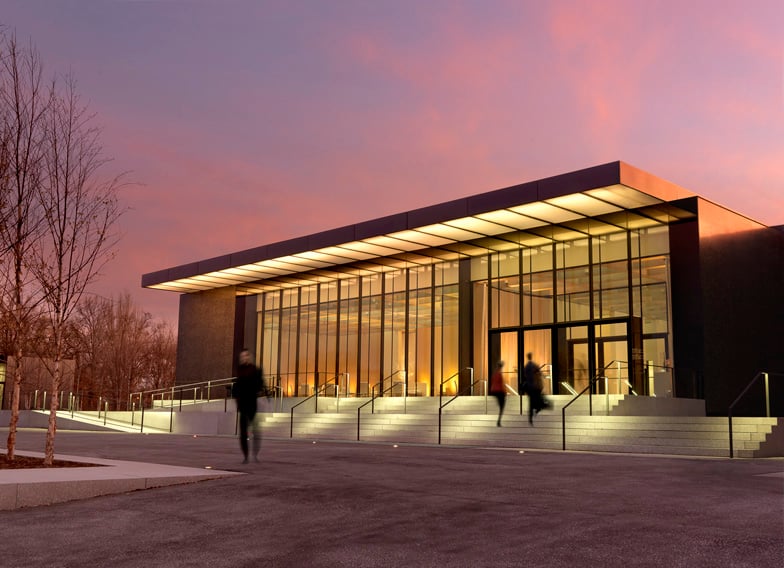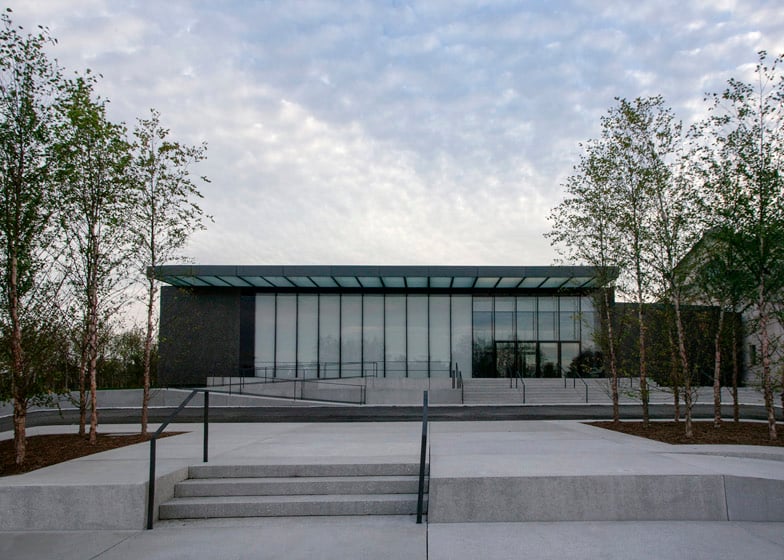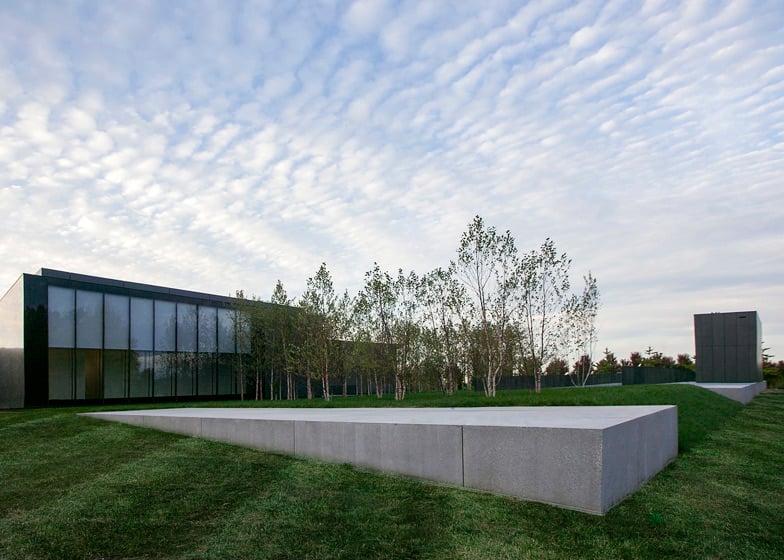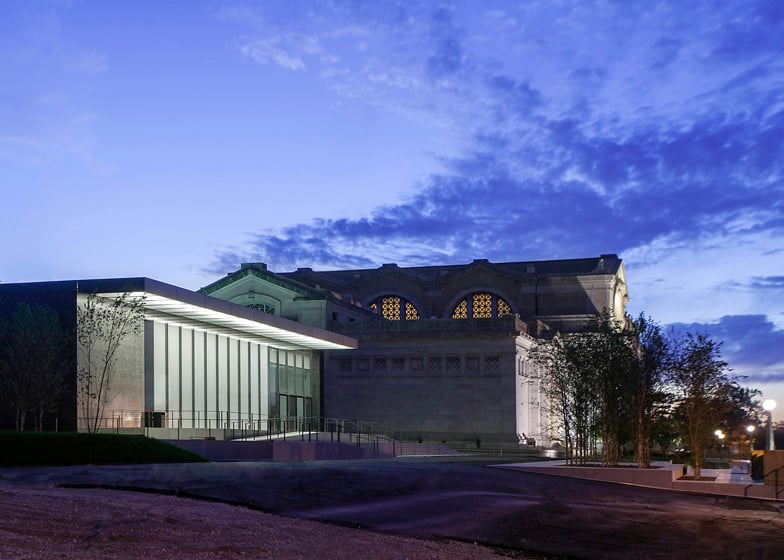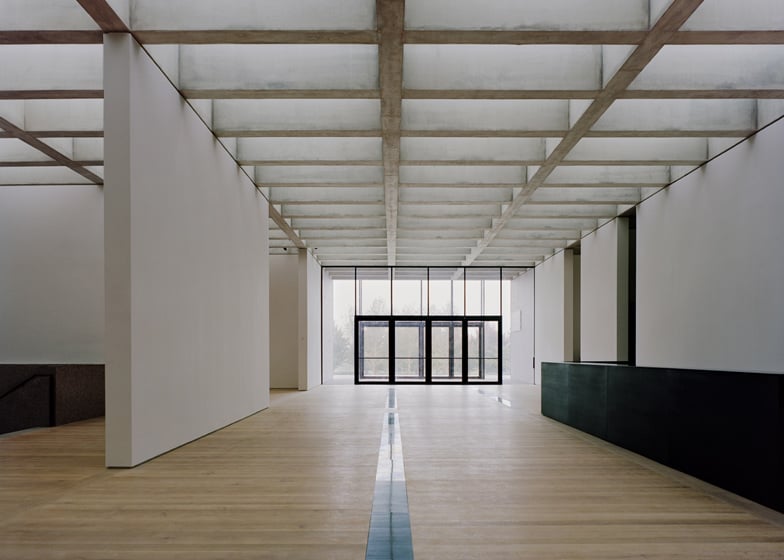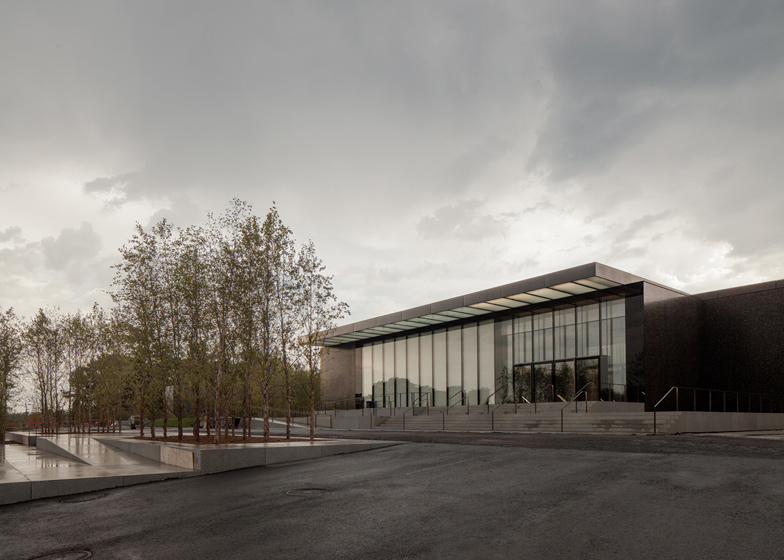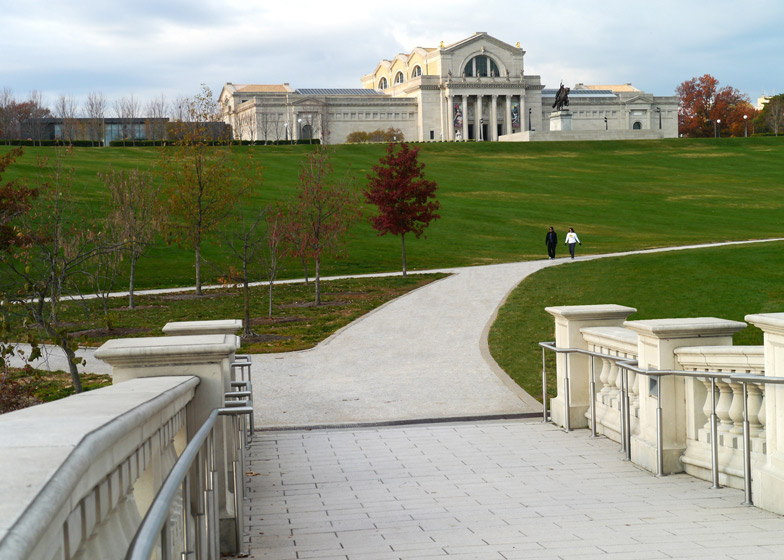British architect David Chipperfield has completed a new gallery building at the Saint Louis Art Museum in Missouri (+ slideshow).
With walls of dark polished concrete, stone and glass, the East Building was designed as a contemporary counterpart to the Italian-inspired museum designed by Cass Gilbert for the 1904 World's Fair.
David Chipperfield's design features a grand staircase that connects the old building with the extension. Visitors can choose to enter the museum through Gilbert's original portico or though the glazed frontage of the new wing.
The polished dark concrete walls are speckled with aggregates from the Missouri River, while inside a coffered concrete ceiling runs through the building and integrates a grid of skylights that let daylight filter down onto an oak floor.
Above: photograph is c/o the Saint Louis Art Museum
Set to open on 29 June, the East Building will accommodate both permanent collections and special exhibitions, giving the museum around 30 percent more gallery space. Temporary exhibitions will no longer be held in the main building, which will now be dedicated to static exhibits.
Above: photograph is by Simon Menges
Additional spaces include a 100-seat restaurant, a 60-seat cafe and an underground parking zone.
David Chipperfield first revealed designs for the structure in 2005, but the project had been delayed by funding issues. Architecture firm HOK worked alongside Chipperfield to deliver the building.
Above: photograph is by Simon Menges
The London-based architect has worked on a number of museum projects over the years. In 2007 he won the Stirling Prize for the Museum of Modern Literature in Germany and he also designed the Hepworth Wakefield gallery in the UK. Recent projects include designs for a museum of fine arts in Reims, France. See more architecture by David Chipperfield.
Photography is by Jacob Sharp, apart from where otherwise stated.
Here's some more information from the press release:
Expanded and Renovated Saint Louis Art Museum to Open its New East Building by Sir David Chipperfield on June 29-30, 2013
Brent R. Benjamin, director of the Saint Louis Art Museum, today announced details of the grand opening of the Museum's more than 200,000-square-foot East Building, designed by renowned British architect Sir David Chipperfield with technical assistance from HOK. A weekend celebration, held on June 29 and 30, will welcome the public to the monumental new structure of dark polished concrete-and-stone panels and floor-to-ceiling windows, set in historic Forest Park as a contemporary counterpart to the scale and dignity of the original building, designed by Cass Gilbert for the 1904 World's Fair.
All inaugural exhibitions in the East Building will be drawn from the collections of the Saint Louis Art Museum, revealing as never before the riches of one of America's premier encyclopedic art museums. The expansion adds 82,452 square feet of galleries and public space – an increase of about 30 percent – while linking the Museum more closely with Forest Park through a design by the celebrated French landscape architect Michel Desvigne. The project also adds a host of new visitor amenities to the Museum, all in support of a civic institution that is always open free to the public.
"The ideal of a democratic Palace of the Arts, which Cass Gilbert so powerfully embodied in our original building, now finds beautiful, modern-day expression, at once rigorous and elegant, in the adjoining masterwork by Sir David Chipperfield," Brent R. Benjamin stated. "Celebrating the Forest Park site, harmonizing with the 1904 building, and creating a distinctive architectural work for our own time, the East Building will offer the people of St. Louis, and our visitors from around the world, a remarkable new view of the outstanding collections of this Museum and of the vital role that an art museum can play in public life."
Barbara B. Taylor, president of the Saint Louis Art Museum, stated, "The unprecedented success of the East Building capital campaign, which to date has secured commitments of more than $160 million, surpassing its $145 million public goal, is a testament to the importance of the Saint Louis Art Museum in the life of our city, and a statement of confidence in this Museum's position among national institutions."
Inaugural exhibitions to celebrate the collections
The Museum's collections span some 5,000 years and feature masterpieces from the ancient Mediterranean, Asia, Africa, the Islamic world, Europe and the Americas. All aspects of the collections will be celebrated at the time of the opening.
In the East Building, the inaugural installation in the new special exhibitions galleries will be Postwar German Art in the Collection, an extensive re-examination of this major aspect of the Museum's holdings. The exhibition will address themes and groupings such as the legacy of Joseph Beuys; the large-scale works of Gerhard Richter, Sigmar Polke and Anselm Kiefer; and the influence of the Düsseldorf School of Photography. Drawing from impressive strengths in the Museum's collections, these galleries will feature works by artists including Georg Baselitz, Jörg Immendorff, Martin Kippenberger, Bernd and Hilla Becher, Andreas Gursky and Candida Höfer.
The East Building galleries dedicated to the permanent collection will explore developments in American art after World War II. Beginning with American responses to Surrealism and the emergence of Abstract Expressionism, the presentation will proceed to movements including Minimalism, Pop and Process art. Galleries also will address themes such as the return to figuration and contemporary modes of abstraction. Artists represented in the installation will include earlier figures such as Jackson Pollock, Mark Rothko, Frank Stella,Ellsworth Kelly and Andy Warhol and more recent artists such as Leonardo Drew, Teresita Fernández, Kerry James Marshall and Julie Mehretu. Thirty percent of the works in the installation will not have been on view for approximately a decade.
The Museum's former temporary exhibition galleries in the 1904 building will now be devoted to the permanent collection, and more than 50 galleries in the Cass Gilbert-designed Main Building recently have been reinstalled as part of a renovation project complementing the East Building expansion. Notable reinstallations in the original building include the galleries for 18th century European art, with works by Canaletto, Tiepolo, Chardin, Reynolds and Gainsborough presented within the context of the Grand Tour; the French Impressionist and Post-Impressionist galleries, with works by masters from Manet, Monet and Renoir through van Gogh and Gauguin installed thematically; and a dedicated gallery to house the Museum's collection of the work of Max Beckmann, the largest of its kind in the world.
Among the major reinstallations to be revealed at the time of the grand opening will be A New View: Surrealism, Abstraction and the Modern City. Exploring three great themes in the art of the first half of the 20th century, the installation will examine Surrealism as reflected in the work of Giorgio di Chirico and Max Ernst and the abstract approaches evident in works by Paul Klee, Roberto Matta, Pablo Picasso, Joan Miró and Alberto Giacometti. A second section of the installation will focus on the pivotal role of Piet Mondrian in European abstraction. The third section will explore the importance of urban imagery in the work of artists including Ernst Ludwig Kirchner, Amedeo Modigliani and Robert Delaunay.
Another major reinstallation in the 1904 building will be A New View: Ancient American Art, presenting some 300 works from the ancient cultures of the WesternHemisphere. Constituting the first reconfiguration since 1981 of the Museum's esteemed collection of ancient American art, the installation will include works from the Inca and Moche of South America, the Maya and Aztec of Mexico and the Mississippian cultures of the Midwest.
The opening of the East Building will also mark the inauguration of Stone Sea, a major new outdoor work commissioned by the Museum from the celebrated British sculptor Andy Goldsworthy. Using stone from the Earthworks Quarry in Perryville, Mo., Goldsworthy has built 25 10-foot arches, each weighing approximately 13 tons, arranged in a dense composition that evokes the texture and movement of theancient shallow seas that once covered the Midwest.
Highlights of the East Building design
Visitors to the Saint Louis Art Museum may use the existing Sculpture Hall entrance in the 1904 building, where Cass Gilbert's original main-floor layout has been restored as part of the expansion project, or may use the fully accessible new entrance to the East Building. Either way, the contrast is immediately apparent between the neo-classical 1904 building and the East Building, with its facade of floor-to-ceiling windows and twenty-three monumental panels of dark polished concrete gleaming with highlights of Missouri river aggregates.
David Chipperfield's design joins the two buildings seamlessly with a new Grand Stair, which also establishes clear and organic connections among primary circulation axes. The new circulation path leads directly from the Grand Stair to lower-level galleries and a concourse with a new 60-seat cafe, a renovated museum shop and auditorium, and access to a new below-grade parking garage.
The outstanding design feature of the galleries of the East Building is an innovative coffered ceiling made of white concrete. The ceiling houses 698 coffers, most with scrimmed skylights to provide abundant but controlled natural light to the galleries. The lighting system is designed in collaboration with Arup.
Floors in the East Building are made of six-inch-wide planks of white oak, and the floor vents are stainless steel, both chosen to minimize distraction from the works of art.
The landscape design by Michel Desvigne features the installation of outdoor sculptures by artists including Alexander Calder, Henry Moore and George Rickey; as well as new plantings – including approximately 300 trees – in accordance with St. Louis's existing Forest Park Master Plan. The landscape design will be executed in phases, with much of the most significant work to be completed after the June 2013 opening.
New visitor amenities
The outstanding new amenity in the East Building will be a new 2,500-square-foot restaurant, offering seating for 100 patrons with dramatic views overlooking Forest Park's Art Hill. A private dining room in the restaurant will accommodate as many as 40 guests. Operating the restaurant and the new Museum cafe will be the Bon Appétit Management Company, which is known for its restaurant service at institutions including the Art Institute of Chicago, the Seattle Art Museum and the Getty Center.
Among the other significant amenities offered as part of the expansion project are a renovated museum shop, a renovation and upgrade of the 480-seat auditorium, the provision of three new classrooms, a dedicated art-study space and a school-group entrance in the existing buildings and the development of a new 129,000-square-foot below-grade parking garage in the East Building, accommodating 300 vehicles.

